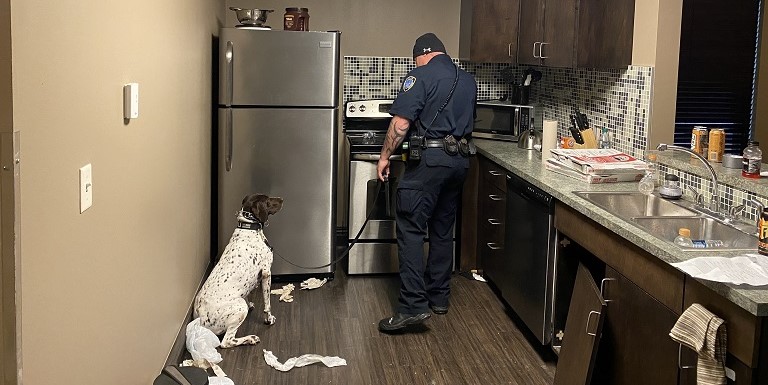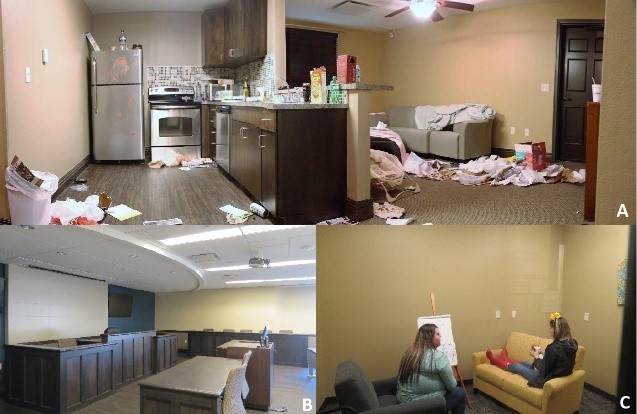Northwest Arkansas Community College: Child Advocacy Studies Program Sends Students Into the Workforce as Seasoned Professionals

Somewhere in the United States today, six-year-old Shelby musters enough courage to report physical abuse to a school counselor. The counselor, who has good intentions but is not well trained in best practices for responding to child maltreatment, calls Shelby’s parents to talk about the allegations. The parents promptly deny the child’s assertions and explain away Shelby’s bruises as a fall down the stairs. No investigation is initiated and Shelby, disheartened after working up the nerve to ask for help, will never tell anyone else about this incident or those still to come. If an investigation had been initiated, professionals would have discovered that Shelby is living a nightmare, with insects and rodents in every cabinet, drug paraphernalia on the coffee table, and a cage that serves as a bed for her brother.
Scenarios like Shelby’s unfold every day across the country. Well-meaning professionals fail to prevent and intervene in child maltreatment because they are neither properly educated on the subject in college nor adequately trained by their employer. In 2002, Woodtli and Breslin reported that few academic programs in child protection-related fields, such as education, social work, criminal justice, and health care, include any coursework in even the basics of recognizing and responding to suspected child maltreatment. More recently, welfare training in child-serving fields continues to be inadequate. Medical professionals, for example, receive as little as five hours of education on trauma-informed care and addressing adverse childhood experiences (Dichter et al., 2018). Law enforcement professionals receive an average of six hours, if any, on child maltreatment in basic training (Reaves, 2013). Only 9 percent of CACREP-accredited programs require content covering child sexual abuse (Kenny & Abreu, 2015). Furthermore, many collegiate textbooks contain inaccurate information (Douglas & Serino, 2013), lack emphasis or clarity (Kissee, Isaacson, & Miller-Perrin, 2014), and/or possess imbalanced or limited content (Brand et al., 2019) pertaining to child maltreatment. This chronic lack of adequate child maltreatment response training has led to burnout and turnover in child protection fields as students graduate from academic institutions ill prepared for and unaware of the realities of child maltreatment intervention.
Child Advocacy Studies (CAST), a curriculum designed to increase understanding of the factors that contribute to child maltreatment, fosters recognition of the signs of potential maltreatment and informs students of evidence-based best practices for responding to child maltreatment. CAST is an educational program founded by child protection expert Victor Vieth, Director of Research and Education for Zero Abuse Project, a 501(c)(3) nonprofit located in St. Paul, Minnesota.
CAST at Northwest Arkansas Community College
In 2018, Northwest Arkansas Community College (NWACC) became the first community college to receive formal CAST accreditation, joining only three other institutions to earn such recognition among the seventy-nine U.S. CAST programs currently in existence. CAST students at NWACC may earn a certificate of proficiency, a technical certificate, or an associate of arts degree. The program provides professional skills for students who plan to enter the workforce in a myriad of professions, including law enforcement, law, forensic science, social work, medicine, counseling, advocacy, and education, and who will be required to work as part of a unified multidisciplinary team to effectively prevent and respond to child maltreatment.

Melba Shewmaker National Child Protection Training Center (NCPTC) (A) mock house, (B) mock courtroom, and (C) forensic interview room for CAST student experiential learning.
Although special facilities are not necessary for CAST implementation, at NWACC’s Melba Shewmaker National Child Protection Training Center (NCPTC), students have access to frontline professionals and experiential learning facilities, including a fully functioning house, mock courtroom, forensic interview rooms, and a medical examination room, to learn how to prevent, investigate, and respond to allegations of child maltreatment. NWACC’s two-story mock house can be staged to fit nearly any scenario and allows students to practice a search warrant or home visit before entering the field. Volunteer actors and situations derived from actual investigations make the scenarios authentic, allowing students to experience the complexities of each case. Students develop and hone practical skills, including spotting risk factors, creating prevention plans, conducting home visits, collecting corroborating evidence, and interviewing witnesses, all with a trauma-informed approach that works to avoid triggering events or reopening wounds associated with a history of trauma. Research shows this curriculum may graduate students into the workforce with the same level of experience it takes a professional five years in the field to achieve (Parker et al., 2019; see also Vieth et al., 2019).
The mock house also proves useful to frontline professionals. Local law enforcement agencies use the house to drill emergency response formations, train K-9 units, and conduct mock investigations. Paramedics and home health nurses gain new skills for working with patients in challenging home environments and documenting evidence of child maltreatment that might be unrelated to their original call. The college offers the space to state organizations at no cost or a reduced cost to help mitigate the burnout that professionals face without the necessary skills and training. Secondary schools also make use of NCPTC to give their students an opportunity to engage in experiential learning. For instance, the building is well suited for a junior high English class to engage in a persuasive writing mock trial exercise or a high school nursing class to document hazards to a patient during a home visit.
Envision Shelby’s school counselor, now educated and prepared through CAST, when she hears Shelby’s story. The counselor invests in Shelby’s account, collects pertinent details from Shelby, and makes a report to her state’s child abuse hotline. Frontline professionals begin to respond and investigate, using the knowledge they, too, gained in a CAST program at their local community college. Ultimately, community colleges and CAST-trained students have the opportunity to change the lives of the children in their service areas.
Click here or contact Stephanie Morris to learn how to implement CAST at your institution.
References
Brand, B. L., Kumar, S. A., & McEwen, L. E. (2019). Coverage of child maltreatment and adult trauma in graduate psychopathology textbooks. Psychological Trauma Theory Research Practice and Policy, 11(8), 919-926. https://doi.org/10.1037/tra0000454
Dichter, M. E., Teitelman, A., Klusaritz, H., Maurer, D. M., Cronholm, P. F., & Doubeni, C. A. (2018). Trauma-informed care training in family medicine residency programs: Results from a CERA survey. Family Medicine, 50(8), 617-622. https://doi.org/10.22454/FamMed.2018.505481
Douglas, E. M., & Serino, P. J. (2013). The extent of evidence-based information about child maltreatment fatalities in social science textbooks. Journal of Evidence Based Social Work, 10(5), 447-454. https://doi.org/10.1080/15433714.2012.759839
Kenny, M. C., & Abreu, R. L. (2015) Training mental health professionals in child sexual abuse: Curricular guidelines. Journal of Child Sexual Abuse, 24(5), 572-591. http://dx.doi.org/10.1080/10538712.2015.1042185
Parker, J., McMillan, L., Olson, S., Ruppel, S., & Vieth, V. (2019, November 26). Responding to basic and complex cases of child abuse: a comparison study of recent and current child advocacy studies (CAST) students with DSS workers in the field. Journal of Child & Adolescent Trauma. https://doi.org/10.1007/s40653-019-00297-7
Reaves, B. A. (2013). State and local law enforcement training academies, 2013. U.S. Department of Justice. https://www.bjs.gov/content/pub/pdf/slleta13.pdf
Vaughan-Eden, V., & Vandervort, F. E. (2013, February 27). Invited commentary on “issues in differential response.” https://doi.org/10.1177%2F1049731513478843
Vieth, V. I. (2012). Senate Judiciary Subcommittee on administrative oversight and the courts: Congressional testimony. https://www.judiciary.senate.gov/imo/media/doc/12-5-23ViethTestimony.pdf
Vieth, V. I., Goulet, B., Knox, M., Parker, J., Johnson, L. B., Tye, K. S., & Cross, T. P. (2019). Child advocacy studies (CAST): A national movement to improve the undergraduate and graduate training of child protection professionals," Mitchell Hamline Law Review, 45(4). https://open.mitchellhamline.edu/cgi/viewcontent.cgi?article=1199&context=mhlr
Woodtli, M. A., & Breslin, E. T. (2002). Violence-related content in the nursing curriculum: A follow-up national survey. Journal of Nursing Education, 41(8), 340-348.
Lead image: Law enforcement officers use the NCPTC mock house to train K-9 units.
Stephanie Morris is the Child Advocacy Studies Program Coordinator at Northwest Arkansas Community College in Bentonville, Arkansas.
Opinions expressed in Member Spotlight are those of the author(s) and do not necessarily reflect those of the League for Innovation in the Community College.










